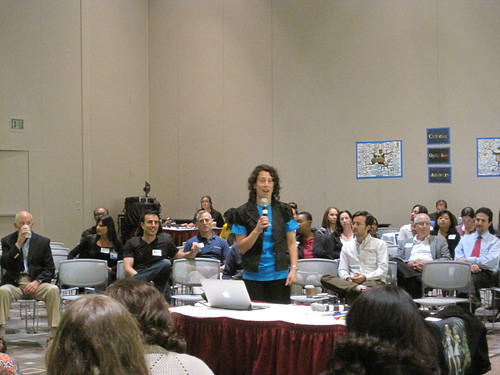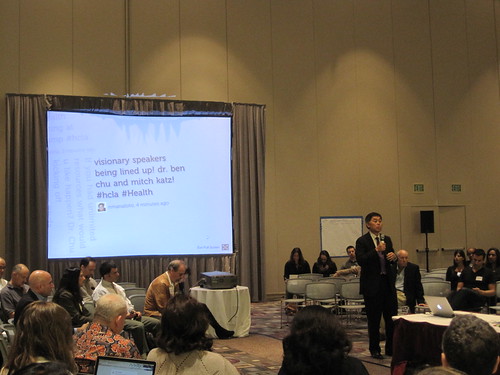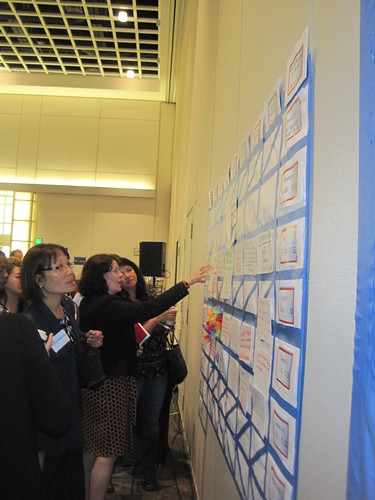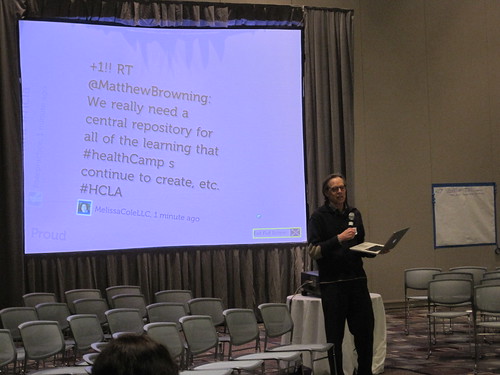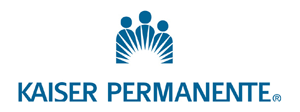Recap from HealthCamp Los Angeles
@MJChatter posted a number of photos from HealthCampLA to Flickr:
Recording of the Wrap-up Session
The Closing session was recorded on UStream by Gregg Masters (@2healthguru). http://www.ustream.tv/recorded/18251782
Re-Inventing Community Health at HealthCampLA
The original blog post can be found on Mark Scrimshire’s Blog
This week we spent 33 hours in Los Angeles working with the team at Kaiser Permanente Southern California to host HealthCamp Los Angeles (http://healthca.mp/la).
This was the first HealthCamp in Los Angeles. The event was held at the Pasadena Convention Center and brought together participants from Kaiser Permanente, Los Angeles County Health Services, County of Los Angeles Public Health and a number of other public health experts together with entrepreneurs, patients and other people who are passionate about improving health care.
The day was kicked off By Danielle Cass who introduced the two Fire Starter Speakers:
Dr. Ben Chu, Regional President, Kaiser Permanente Southern California
Dr. Mitch Katz, Director, Los Angeles County Department of Health Services
After their thought provoking talks which illustrated how total health means thinking beyond purely health care. We need to think about the implications of school and housing environments and how they impact our health.
After the talks and introductions by everyone in the room then the participants created the agenda for the day before breaking off in to the break out sessions.
After a day of thought provoking discussions the recap session generated a list of ten key takeaways from the day. Here they are:
1. Practice What You Preach and “Highlight the Positive”
2. “The Power of One” is magnified when we share.
3. Encourage Healthy Work Habits
– Such as “Walking Meetings” (A shout out to chief advocate Dr. Ted Eytan for encouraging walking meetings) and design for health by doing such things as making stairwells interesting to make it attractive for people to use the stairs.
4. “Change the Norms”
– This was one of the most powerful ideas. Don’t try to change behavior, change people’s ideas of what is normal because we are social animals that want to fit in. Just look at how our views on smoking have changed in the past 10-15 years.
5. Specialists need to remember to “Pay it Forward.”
– If Specialists can train others to handle routine maintenance or testing processes they can focus on more complex issues.
6. Walk the Talk
– But we don’t have to be perfect – Micro choices work when we strive to make more good micro choices than poor ones.
7. Partner for Efficiency
– We can extend our reach and influence by working with others.
8. Effective = Optimal But Optimal does not necessarily mean Ideal.
– This concept came from one of the Nutritionists in the room. Recommending a course of treatment, such as a meal plan is only effective if it is achievable. An ideal plan is not effective if it is impractical or un-implementable by the patient.
9. Design for Health
– Let’s think about how we can design our schools and communities to encourage healthy behavior. How can we make healthy food more accessible and enticing than junk food.
10. Sensors
– Sensors are a new frontier in health. Personal sensors such as FitBit and Smartphones provide the ability to track and measure with a level of details that has been impossible up to now. The Health Industry needs to learn how to embrace this new frontier of consumer generated data.
Here is Mark Harmel reporting out from one of the sessions:
Posted via email from ekivemark: pre-blogspot
Liked this post? Follow this blog to get more.

